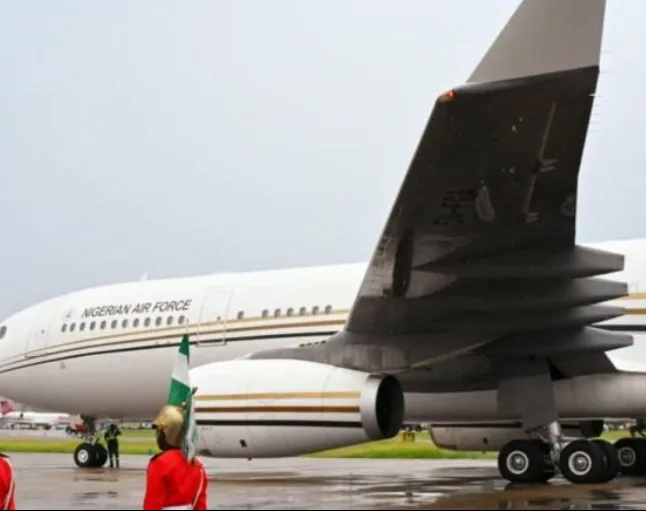Tinubu’s $100m Jet Flown to South Africa for Makeover
EXCLUSIVE: Inside the Pricey Makeover of Nigeria’s New Presidential Jet Amid Mounting Costs and Rising Criticism
By Parrot Newspaper Investigative Desk
May 9, 2025
When President Bola Tinubu embarked on a state visit to Saudi Arabia earlier this year, few Nigerians knew he didn’t fly there aboard the presidential jet. Instead, a chartered private plane completed the journey after technical issues grounded the official aircraft in the Netherlands.
That disruption was only a glimpse into a broader and costlier story: Nigeria’s freshly acquired Airbus A330-200 presidential jet—bought for a reported $100 million in August 2024—is now undergoing refurbishment in South Africa, just months after its purchase.
More than Paint and Prestige
Investigations by Parrot Newspaper reveal that the aircraft, bearing registration number VP-CAC, was flown abroad to receive a custom repaint and refitting to align it with the symbols and stature of the Nigerian presidency. While official sources claim the facelift is routine, insiders suggest the process is far from cosmetic.
“They flew it to South Africa not just to repaint it in Nigerian colours but to reconfigure some of the cabin interior and install upgraded communication systems,” a senior official close to the Presidential Air Fleet (PAF) told Parrot. “These are expensive upgrades, but nobody is publicly discussing the cost.”
The Bill Nigerians Never Saw
Between July 2023 and December 2024, Nigeria reportedly spent over N20.03 billion maintaining and operating the Presidential Air Fleet. Documents reviewed by Parrot, including data from civic-tech platform GovSpend, show that a majority of these funds were channelled through ambiguous labels such as “Forex Transit Funds”—a term typically used for overseas operational expenses.

In 2024 alone, PAF received N14.15 billion, amounting to 71% of its total budget. In just one month—August 2024—over N5.6 billion was disbursed in six separate tranches, making it the most expensive month for the fleet that year. Strikingly, several releases coincided with presidential travels abroad.
Luxury Fleet in a Bleeding Economy
Nigeria’s Presidential Air Fleet, comprising roughly 11 aircraft, is one of Africa’s largest. Yet, according to multiple defense and aviation sources, at least three of the aircraft are currently unserviceable—a troubling detail amid the rising costs.
Among the aging jets are a 19-year-old Boeing 737 (acquired by former President Obasanjo) and a 13-year-old Gulfstream G550. The newer Airbus A330 was meant to solve recurring reliability and maintenance problems. Instead, its early voyage into a foreign workshop raises questions about procurement due diligence and cost justification.
“Why are we spending over $100 million on a plane only to repaint and refit it months later?” asks aviation analyst Jide Olatunji. “Either it wasn’t ready for deployment when purchased or someone is deliberately inflating its post-purchase cost under the guise of standard upgrades.”
A Culture of Secrecy
Despite repeated attempts, neither the Presidency nor the Nigerian Air Force—custodian of the fleet—has provided detailed breakdowns of recent expenses. What has emerged is a pattern of fragmented disbursements: millions paid in bits, often within days of each other, into transit accounts, making public scrutiny more difficult.
“Transparency is absent in the management of these funds,” says civil society advocate Zainab Lawal of the Open Budget Initiative. “Nigerians are being asked to tighten their belts while billions are quietly spent on luxury aviation.”
Still Flying Blind
The paradox is glaring: as inflation soars, the Naira struggles, and subsidy removals bite into household incomes, Nigeria’s top office continues to operate an air fleet more fitting for an oil-rich monarchy than a struggling democracy.
For now, the newly acquired presidential jet—spacious, state-of-the-art, and swathed in mystery—remains parked outside Nigerian skies, undergoing a transformation as expensive as it is symbolic. But the deeper question remains unanswered: At what cost does prestige come in a country still counting every coin?
—

